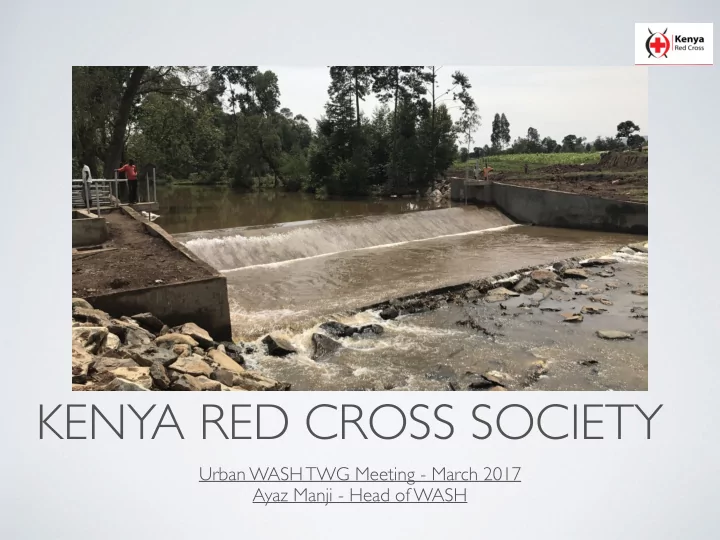

KENYA RED CROSS SOCIETY Urban WASH TWG Meeting - March 2017 Ayaz Manji - Head of WASH
KRCS WASH: Focus shift from Rural to ‘Peri-Urban’ and ‘Urban’ WASH ● programming - Reach, Rural/Urban Migration, Higher Urban Disaster profile, Devolution in Kenya, Lack of service provision by GOK Currently implementing a large scale programme funded ● by BRC/DFID & County Governments dubbed “WASH in Kenya. Programme specifics: ➡ 4 year project: October 2014 - September 2018 ➡ 155,000 people in Bomet, Kilifi & Taita Taveta counties ➡ Increased access to improved and sustainable water and basic sanitation ➡ Improved hygiene and sanitation practices ‘Peri-Urban/Urban’ programmes under the WASH in ● Kenya programme include: ➡ Sigor WS - Bomet - Ongoing - reach over 80K, spend 1.35M EUR - full WS with Tworks ➡ Bamba - Ganze WS - Ongoing - reach over 80K, spend 1M EUR - rising main mid height pumping station with solar power, off takes rehabilitation and distribution points ➡ Maungu Buguta WS - Ongoing - Reach 25K, spend 0.4M EUR - rising main, pumping station and distribution points
KRCS WASH: Programme looks to work within the context of the Country's Water Sector with engagement of all stakeholders as ● shown below - we have played a part in all sectors - policy advocacy, regulation, services provision and consumer The programme took a traditional out look - to design effective WASH interventions (Capacity of the KRCS was key) ● but has taken a role of examining the water sector, influencing & becoming an effective partner Lot of Government (National and County) partnership and interaction as well as interaction and partnership with the ● Water Companies (PPPs) Investment in infrastructure, governance and management systems for effective water supply ●
REFLECTIONS: URBAN? PERI-URBAN? and RURAL? - WASH in nature is a political decision and needs political support - multiple • stakeholders exist and needs a different way of management - auxiliary role of NS is a key framework approach. Principles of RC/RC essential Resource is key - investment from RC/RC partners bring the RC/RC on the table & can levy for funding investment from the • County/Government as well Resource Heavy - reach is better, but capital outlay is also large. Engineering skills a must at the NS. Larger Risk appetite across • the board (Donors, PNS, NS & Stakeholders). Adaptation to ever changing fluidity is key This is how we can gain influence and a voice for those who do not have one (one of our core functions), influence responsible • Government expenditure (Consider how resources come to KRCS and get spent) and serve the most vulnerable as a priority Most likely multiple resource partners - GOK, DFID, Lewis - each having their own context - regulation harmonisation especially • with public monies Stakeholder communication & management is in itself a large part of the work - business unusual! needs focus and investment • GOK Water delivery setup needs to be understood and worked with - different bodies to be consulted and partnered with - • WASREB, WSBs, WSPs, WARMA and WRUAs Post Project Management - capacity building, regulation (political and needs support), NRW management (capacity for the entire • value chain to avoid UfW), political messaging to beneficiaries Documentation of project steps essential - decision making and choices need clarity. Technology choices key, entire System • design approach required The Devil is in the details - due to risk profile, depth in details is key • Standards of drinking water need evolution from ‘improved’ to ‘safe’ - potential for crisis and political backlash is huge • Management Capacities - internally (Eng, Social Eng, procurement, financing, comms) & externally (Structures to run the system) • are key consideration Phase approaches should be considered - do something today for the next 30 years • Consultation is key - sharing and getting opinions from outside the organisation is key - as a NS, how to balance this is also • important This change in strategy has made KRCS a key player in the Water Sector in Kenya with recognition from the MOWI, wining • MaPIA (Maji Performance and Innovation Awards) and being invited to sit on Boards that look into water Governance
THANK YOU QUESTIONS PLEASE?
Recommend
More recommend